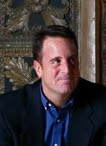On Monday, a commenter named "Ken" took me to task for my claim that recent stats about the effectiveness of phone book advertising appear to be self-serving. One of Ken's arguments was that "The Internet is wonderful thing, but [the] myth that it [sic] all we need doesn't hold water." First, I've never said that the Internet is "all we need." I don't think any advertising medium is a smoking-gun, and I've posted in the past about how the web can be as ineffective as traditional media. But, yes, if I had to choose between the two, I'd take the web over the phone book every time. Although that's not saying a lot, because I'd usually take any medium over the phone book.
Ken went on to claim that "The Wall Street Journal reported recently that the broadband market is about tapped out." That sounded a little preposterous, so I did some research and found this recent WSJ article, which seemed to make precisely the opposite argument: [B]roadband adoption is accelerating. Government studies confirm that America's broadband growth rate has jumped from 32% per year to 52%. With new numbers expected shortly, we anticipate a continued positive trend.
Now that same WSJ article did support Ken's assertion that "[b]arely more than 50% of households in the U.S... currently subscribe to a high-speed Internet service." However, those numbers can fluctuate wildly depending on how you define "broadband." Earlier reports from Nielsen estimate a 78% broadband penetration rate. Now, I'm not saying that Nielsen's number is right and the 52% number is wrong. But I'm not finding a lot of support for the claim that "the broadband market is about tapped out."
Ken also took exception to my skepticism about the source of the data cited in the MSNBC story about Old Yeller's effectiveness. Ken said that the research was the product of "several highly respected research groups. The data is real so believe it." Well, I might be willing to do that--if not for the industry's lack of credibility with others, as reported today on btobonline.com. You'll forgive me if that makes the Yellow Pages' claims seem a little dubious.
Finally, I want to address Ken's final paragraph, which I'll reprint here in its entirety:The VCR didn’t replace movie theaters, TV didn’t replace radio, and the Internet will NOT be replacing the printed Yellow Pages. It will supplement it. There is no other directional media that can provide buyers the information they need when they need it about local businesses than the print Yellow Pages. It is truly the original local search engine….
A few notes:
1. No, the VCR didn't replace movie theatres. But the DVD player has pretty much replaced the VCR. And the Internet is causing a serious downturn in movie theatre attendance.
2. No, TV didn't replace radio. But there's no question that the Internet is challenging the relevance of both media.
3. The last two sentences sound like they come directly from a Yellow Pages talking points memo, but let's just say that the industry's attempt to compare itself to a "search engine" is telling. You don't, on the other hand, see other media calling themselves "the new local Yellow Pages."
Here's the thing: I don't like criticizing commenters. I need all the traffic I can get, and I don't want to scare anyone away. However, one of the things that makes advertising so confusing today is that there's a lot of bad information out there, most coming from people who will tell you just about anything to sell you ad space. Now I have no allegiance to any one medium. I'll use anything that works. But I'm guessing Ken is more interested in his own self-preservation than getting his facts straight.
If Ken doesn't work for some derivative of the phone book industry, I'll eat my words--and every page in the phone book. I'll have to borrow someone else's, though, since I've moved on to the new local search engine.
Tuesday, April 1, 2008
The facts about broadband--and the Yellow Pages
Subscribe to:
Post Comments (Atom)





2 comments:
As new mediums and technologies are developed, the old ones usually change, modify or just go away.
When Television grew from 9 stations nationwide in 1946 to the hundreds we have now, Radio switched from airing long form dramas and comedies to becoming local music boxes.
I don't see how Yellow Pages can evolve. I predict a certain death. http://sclohonet-thebook.blogspot.com/2008/03/predictions-for-future-advertising.html
Fascinating information I haven’t been experienced such information in quite a long time
unlimited satellite internet
Post a Comment